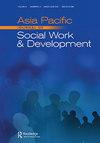2019冠状病毒病与澳大利亚实地教育:探索模拟的使用
IF 1
4区 社会学
Q3 SOCIAL WORK
Asia Pacific Journal of Social Work and Development
Pub Date : 2021-07-14
DOI:10.1080/02185385.2021.1945951
引用次数: 8
摘要
鉴于2019冠状病毒病导致的社会工作教育的变化,在社会工作领域教育中使用模拟提供了一种帮助技能发展和培训的策略。本研究的目的是探讨在COVID-19期间如何利用模拟。一份混合方法的在线调查被发送给澳大利亚的社会工作学者和实地教育工作者(n = 33)。使用模拟的障碍包括成本、缺乏专业知识、技术、对学生实际实践机会的限制和认证问题的担忧。在野外教育中加入模拟对技能发展有很大的帮助,并允许学生接触复杂的场景。文章接收日期2020年12月17日接收日期2021年6月16日本文章由计算机程序翻译,如有差异,请以英文原文为准。
COVID-19 and field education in Australia: exploring the use of simulation
Given the change in social work education due to COVID-19, the use of simulation within social work field education provides a strategy to assist with skill development and training. The purpose of this study was to explore how simulation was utilised during COVID-19. A mixed-methods online survey was sent to social work academics and field educators within Australia (n = 33). Barriers to using simulation included costs, lack of expertise, technology, concerns regarding the limiting of student’s real-world practice opportunities and accreditation issues. The inclusion of simulation in field education has promise in skill development and allows student exposure to complex scenarios. ARTICLE HISTORY Received 17 December 2020 Accepted 16 June 2021
求助全文
通过发布文献求助,成功后即可免费获取论文全文。
去求助
来源期刊

Asia Pacific Journal of Social Work and Development
SOCIAL WORK-
CiteScore
4.10
自引率
5.00%
发文量
21
 求助内容:
求助内容: 应助结果提醒方式:
应助结果提醒方式:


